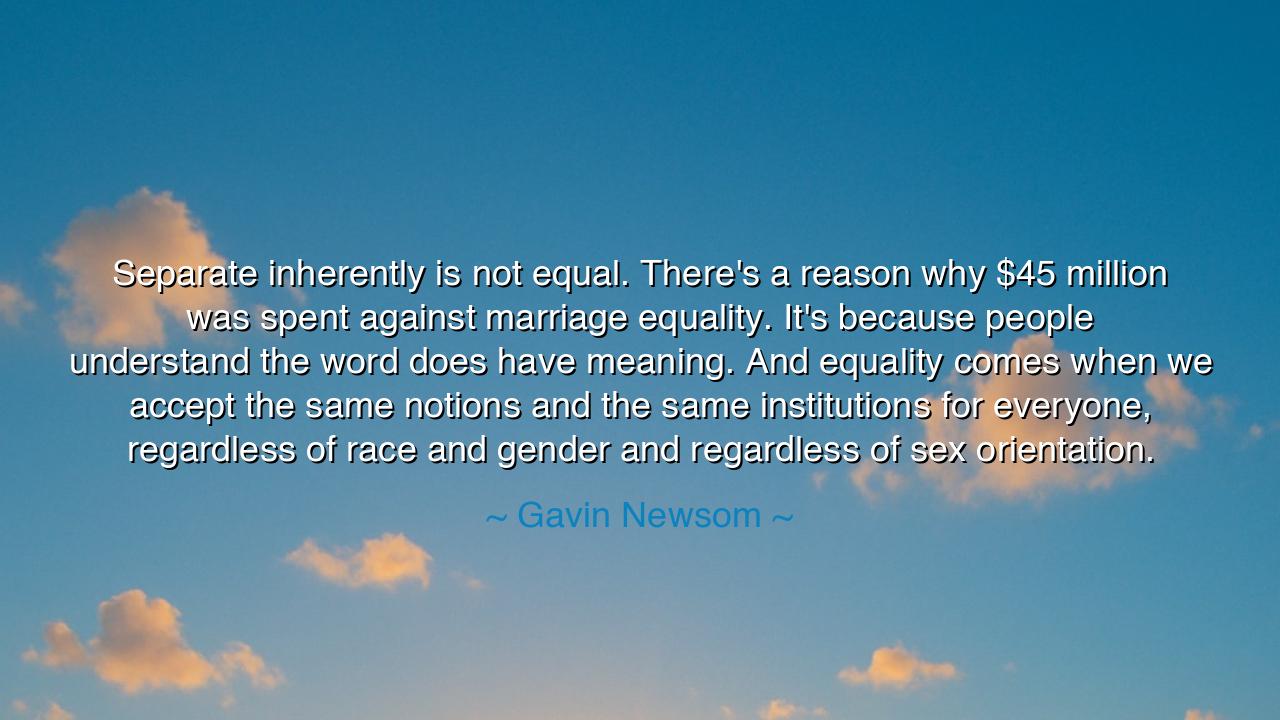
Separate inherently is not equal. There's a reason why $45
Separate inherently is not equal. There's a reason why $45 million was spent against marriage equality. It's because people understand the word does have meaning. And equality comes when we accept the same notions and the same institutions for everyone, regardless of race and gender and regardless of sex orientation.






In the annals of human history, where justice and equality have been both the light guiding and the battleground of many civilizations, there arises a voice that demands not merely tolerance, but true acceptance. Gavin Newsom, a modern-day champion of equality, speaks with the clarity of one who understands the deep truth of our shared humanity: "Separate inherently is not equal. There's a reason why $45 million was spent against marriage equality. It's because people understand the word does have meaning. And equality comes when we accept the same notions and the same institutions for everyone, regardless of race and gender and regardless of sexual orientation." In these words lies a call to arms—to challenge the forces that divide us, to seek a world where justice is not a privilege of the few, but the birthright of all.
To Newsom, the very notion of being "separate" is antithetical to the idea of being equal. Separate does not simply mean different; it means unequal. For in separation, there is a deep, unspoken assumption that one group is somehow lesser or undeserving of the same rights, respect, and opportunities as another. History is rife with examples of separate but unequal systems—most notably in the segregation of black Americans under Jim Crow laws, where the very idea of separation was built on the lie that one race was superior to another. But as Newsom wisely points out, separation breeds inequality, and true equality can only be achieved when all individuals are seen as worthy of the same rights, the same institutions, and the same respect.
Consider the ancient struggle for freedom faced by the Hebrews under Pharaoh in the story of Exodus. For generations, they lived under a system where they were separated from the Egyptians, their labor exploited and their dignity stripped away. The cry of the Israelites was not simply for freedom, but for equality—the right to live as free individuals, to have access to the same rights and opportunities as their Egyptian overlords. It was only when they broke free from separation that they were able to claim the equality promised to them. Their story echoes the truth that true freedom cannot be attained while people remain separated, whether by race, gender, or orientation. Newsom’s words, though modern, resonate with the same eternal cry for justice.
In America’s history, the struggle for marriage equality serves as a mirror reflecting these ancient struggles for justice. The fight for same-sex marriage in the 21st century was not just a legal battle, but a battle of words and meaning. As Newsom rightly points out, the $45 million spent against marriage equality was not simply a campaign of dollars, but a campaign of fear and division. The very word “marriage” held immense power—it was a symbol of legitimacy, of respect, of recognition in society. For some, the idea of opening the institution of marriage to all people, regardless of sexual orientation, was seen as a threat to the traditional institutions they held dear. But for those fighting for equality, the battle was not about changing the institution, but about ensuring that all people, regardless of who they loved, could claim that institution for themselves. Marriage equality was not just a legal change; it was a moral one, a recognition that love and commitment transcend the boundaries that society has created.
In our own time, Nelson Mandela serves as a poignant example of someone who stood against the forces of separation and inequality. Mandela was not simply fighting for the freedom of a group of people; he was fighting for equality, the recognition of every human being as worthy of respect and dignity. His struggle was not just about ending apartheid; it was about creating a society where everyone could live under the same rights, where separation was no longer the default position, but unity and equality were the guiding principles of the land. In much the same way, the fight for marriage equality is a fight for the recognition of everyone’s inherent worth—regardless of sexual orientation.
Thus, the lesson Newsom teaches us is profound: equality is not simply a matter of granting privileges to the deserving few, but of ensuring that everyone is treated with the same respect, dignity, and opportunity. To be separate is to live in inequality, and true equality can only come when we tear down the walls that divide us, when we see that all people—regardless of race, gender, or sexual orientation—are entitled to the same rights and freedoms. To fight for equality is to fight for a world where justice is not a gift, but a right.
Let us then take Newsom’s words into our own hearts. We must stand firm in the belief that true equality is not just an ideal, but a necessity. We must work to end the separation that still exists in our world—whether it be through discrimination against the LGBTQ+ community, racial injustice, or the systemic inequalities that persist in every society. Let us not rest until all people are granted the same institutions and the same respect, for it is only when we stand together, united in our humanity, that we will achieve the equality that has been promised to us all.






AAdministratorAdministrator
Welcome, honored guests. Please leave a comment, we will respond soon